“In a favela with a history of violence between police and drug gangs, or armed battles between traffickers themselves, capoeira is an outlet that gives kids a sense of community – its practice a collective exercise blending characteristics of drum circles, sparring and tag-team gymnastics. Manoel Pereira Costa is a star on this sprawling mountainside in Rio de Janeiro. No matter the nook or cranny, neighbours are eager to greet him anywhere he goes in maze-like Rocinha, one of the biggest and best-known slums, or favelas, that dot the city landscape. As Rio gears up to host the first-ever Olympics in South America, bringing all manner of sport to a country best known for soccer, Costa is revered for helping local youth in the troubled neighbourhood through capoeira, a Brazilian martial art. Over the past three decades, he has run neighbourhood workshops that give kids a chance to immerse themselves in a tradition with roots in the dance, fighting and percussion practices of Africans brought to Brazil as slaves. “There is a very negative image of this neighbourhood”, says 56-year-old Costa. “We more than anything want to teach about community, about citizenry, so that kids understand that they are part of something”.
Costa, or “Master Manel” as his students call their coach and mentor, came to Rio at the age of 19 from the northeastern state of Bahia, where capoeira is most traditional. Currently with some 300 students, Costa does not charge for the courses. His program, known as "Awaken Capoeira," instead relies on financing from donors that include the city government and local merchants. Costa's thousands of former students have gone into fields including television and modelling. Others have gone on to become teachers themselves, in Rio and across Brazil. Several, including a son of Costa's now living in Norway, are even teaching capoeira abroad. They have helped organise trips for Costa and some of his students to perform in countries including Italy, Germany and the Netherlands. With thousands of athletes now descending on Rio for the Olympics, which start Aug. 5, Costa sees another opportunity for his students to feel a connection to something bigger. “Even in this community, with our problems, we are part of the world," Costa says. "And the students have to know that they can step out into it, that they can do anything they want”. – Bruno Kelly via Reuters
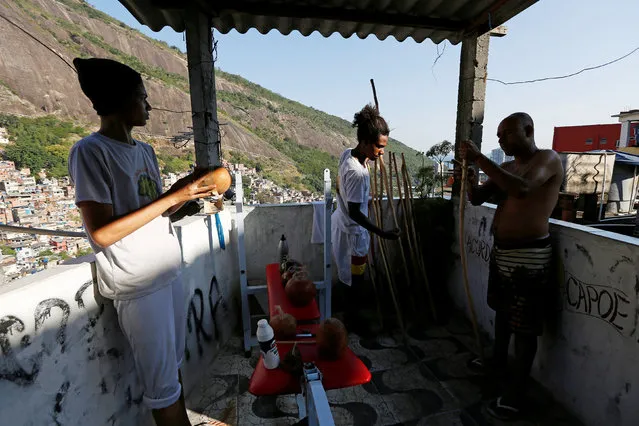
Manoel Pereira Costa (R), known as “Master Manel”, prepares cabacas, to be used with the musical instrument berimbau, with two of his students at his home in the Rocinha favela in Rio de Janeiro, Brazil, July 24, 2016. (Photo by Bruno Kelly/Reuters)
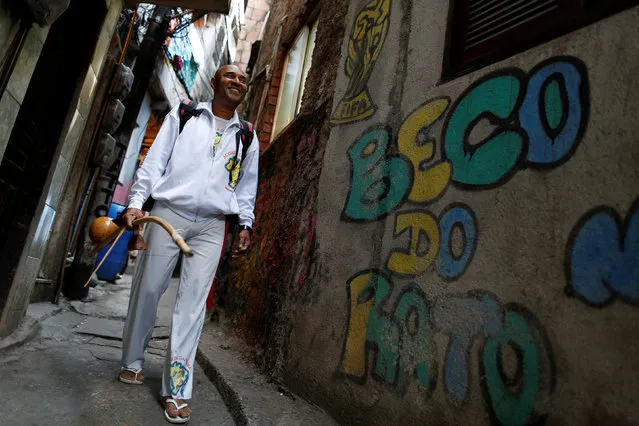
Manoel Pereira Costa, known as “Master Manel”, walks in the Rocinha favela in Rio de Janeiro, Brazil, July 25, 2016. (Photo by Bruno Kelly/Reuters)
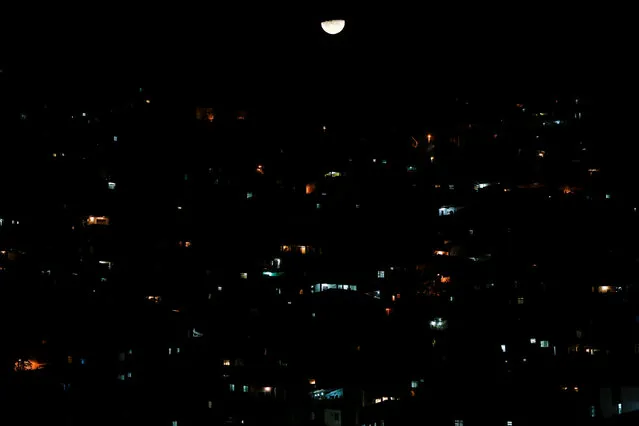
The moon is seen shining over the Rocinha favela, in Rio de Janeiro, Brazil, July 26, 2016. (Photo by Bruno Kelly/Reuters)
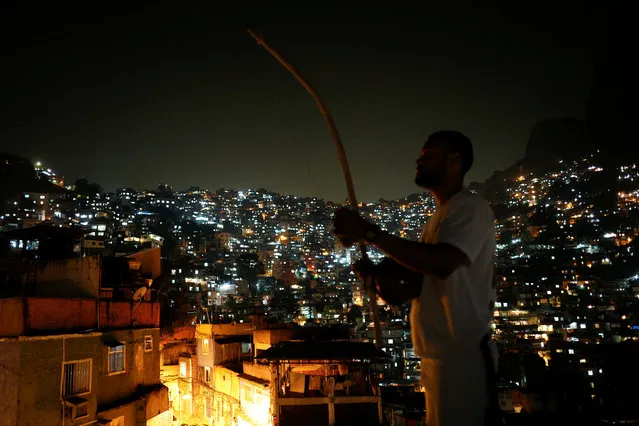
Miquelangelo de Souza Costa Sobrinho, son of Manoel Pereira Costa, poses for a photograph while holding a berimbau in the Rocinha favela, in Rio de Janeiro, Brazil, July 25, 2016. (Photo by Bruno Kelly/Reuters)
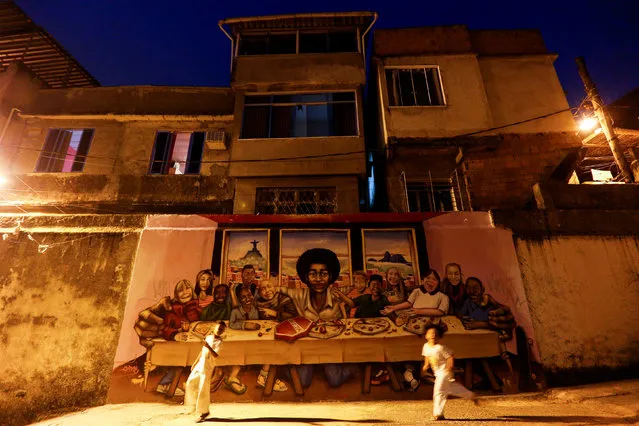
Children run after a capoeira lesson in the Rocinha favela in Rio de Janeiro, Brazil, July 25, 2016. (Photo by Bruno Kelly/Reuters)
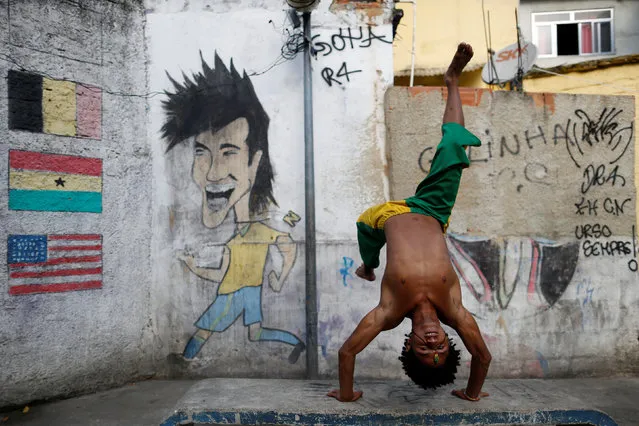
A member of the Acorda Capoeira (Awaken Capoeira) group prepares for a performance for tourists in the Rocinha favela in Rio de Janeiro, Brazil, July 25, 2016. (Photo by Bruno Kelly/Reuters)
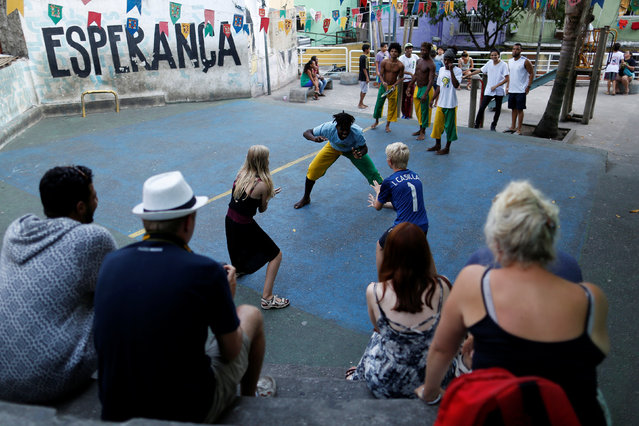
A member of the Acorda Capoeira (Awaken Capoeira) group teaches capoeira to two foreign visitors in the Rocinha favela in Rio de Janeiro, Brazil, July 26, 2016. (Photo by Bruno Kelly/Reuters)
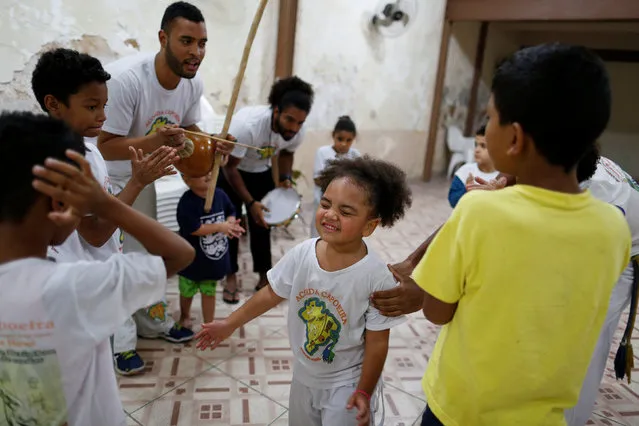
Children participate in a capoeira lesson at a local church in the Rocinha favela, in Rio de Janeiro, Brazil, July 25, 2016. (Photo by Bruno Kelly/Reuters)
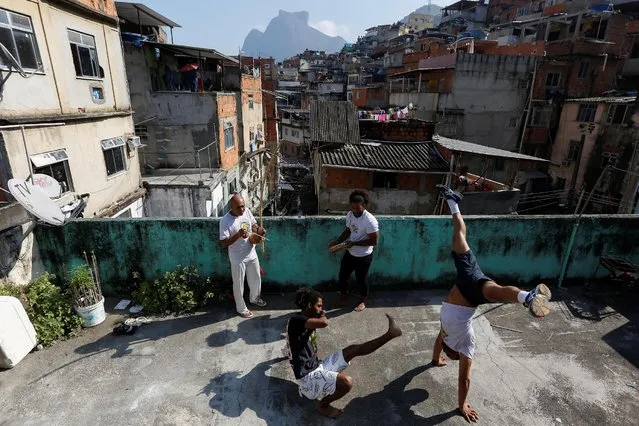
Manoel Pereira Costa (L), known as “Master Manel”, plays the berimbau next to his three sons in the Rocinha favela, in Rio de Janeiro, Brazil, July 25, 2016. (Photo by Bruno Kelly/Reuters)
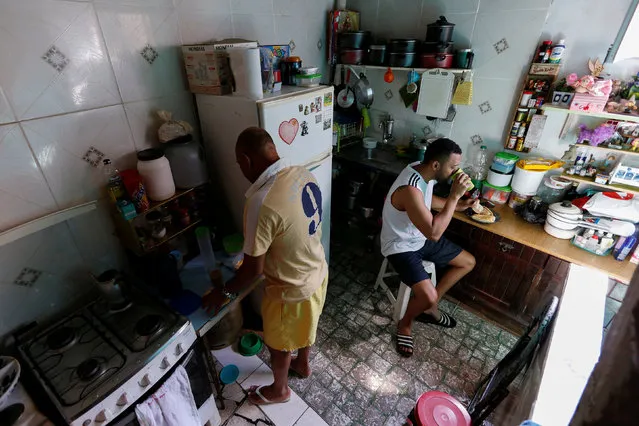
Manoel Pereira Costa (L), known as “Master Manel”, prepares coffee next to his son Miquelangelo de Souza Sobrinho Costa at their home in Rio de Janeiro, Brazil, July 26, 2016. (Photo by Bruno Kelly/Reuters)
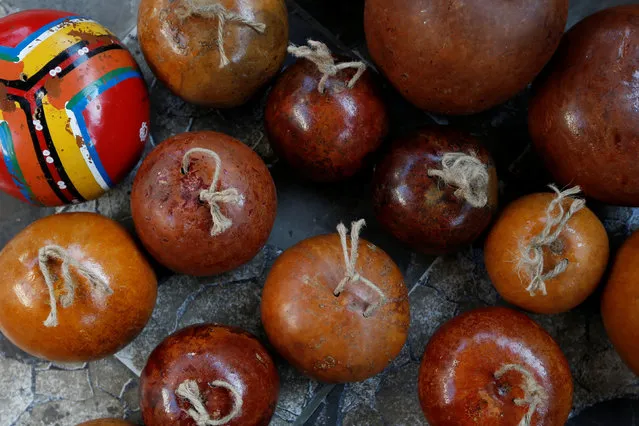
Cabacas to be used with the musical instrument berimbau are seen in the Rocinha favela in Rio de Janeiro, Brazil, July 24, 2016. (Photo by Bruno Kelly/Reuters)
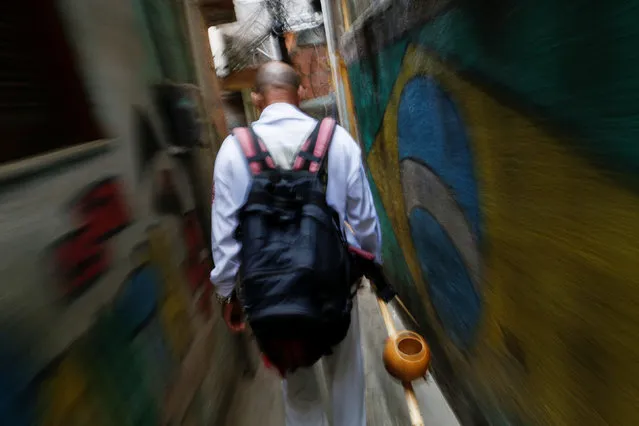
Manoel Pereira Costa, known as “Master Manel”, walks in the Rocinha favela in Rio de Janeiro, Brazil, July 25, 2016. (Photo by Bruno Kelly/Reuters)
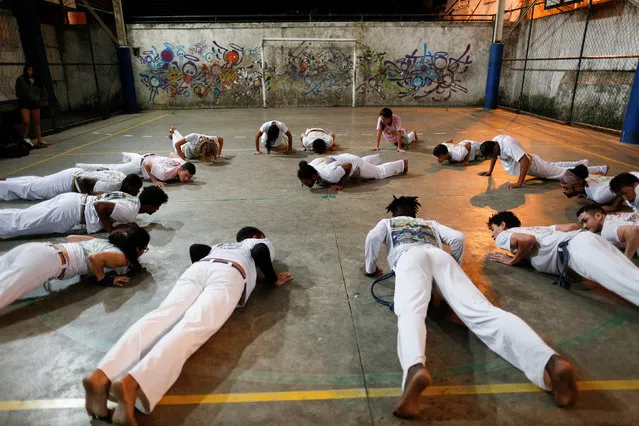
Members of the Acorda Capoeira (Awaken Capoeira) group train at a local school in the Rocinha favela in Rio de Janeiro, Brazil, July 21, 2016. (Photo by Bruno Kelly/Reuters)
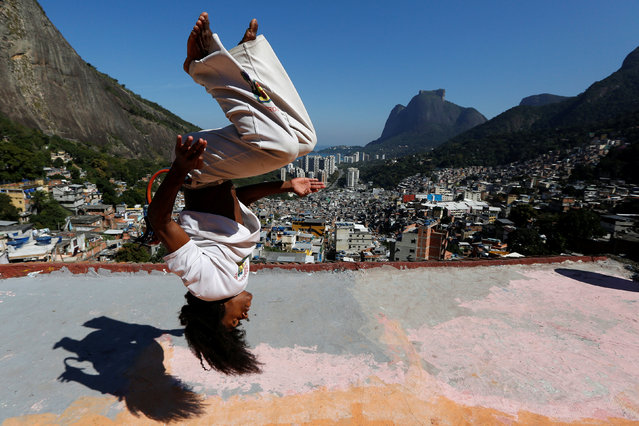
A member of the Acorda Capoeira (Awaken Capoeira) group performs on a rooftop in the Rocinha favela in Rio de Janeiro, Brazil, July 24, 2016. (Photo by Bruno Kelly/Reuters)
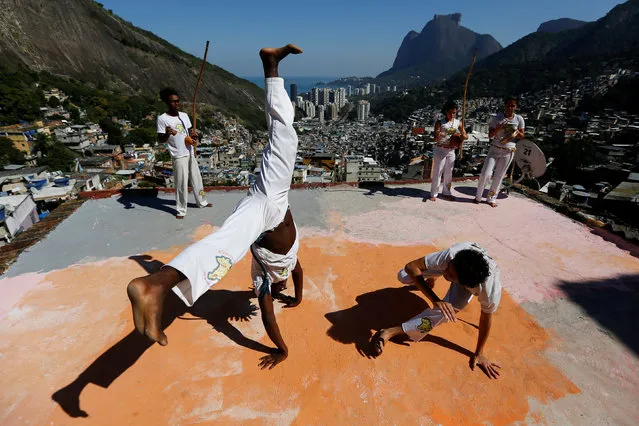
Members of the Acorda Capoeira (Awaken Capoeira) group perform on a rooftop in the Rocinha favela in Rio de Janeiro, Brazil, July 24, 2016. (Photo by Bruno Kelly/Reuters)
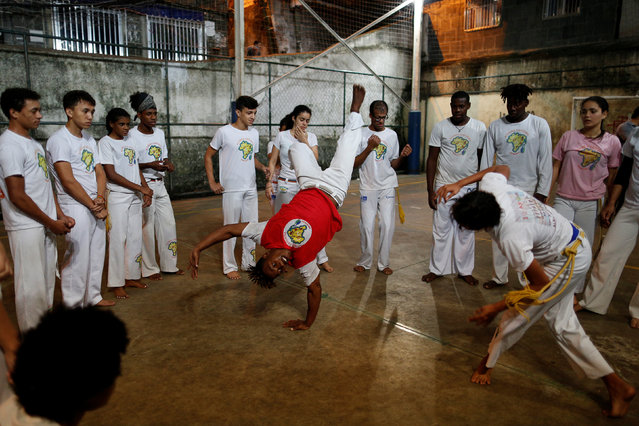
Members of the Acorda Capoeira (Awaken Capoeira) group train at a local school in the Rocinha favela in Rio de Janeiro, Brazil, July 21, 2016. (Photo by Bruno Kelly/Reuters)
Costa, or “Master Manel” as his students call their coach and mentor, came to Rio at the age of 19 from the northeastern state of Bahia, where capoeira is most traditional. Currently with some 300 students, Costa does not charge for the courses. His program, known as "Awaken Capoeira," instead relies on financing from donors that include the city government and local merchants. Costa's thousands of former students have gone into fields including television and modelling. Others have gone on to become teachers themselves, in Rio and across Brazil. Several, including a son of Costa's now living in Norway, are even teaching capoeira abroad. They have helped organise trips for Costa and some of his students to perform in countries including Italy, Germany and the Netherlands. With thousands of athletes now descending on Rio for the Olympics, which start Aug. 5, Costa sees another opportunity for his students to feel a connection to something bigger. “Even in this community, with our problems, we are part of the world," Costa says. "And the students have to know that they can step out into it, that they can do anything they want”. – Bruno Kelly via Reuters

Manoel Pereira Costa (R), known as “Master Manel”, prepares cabacas, to be used with the musical instrument berimbau, with two of his students at his home in the Rocinha favela in Rio de Janeiro, Brazil, July 24, 2016. (Photo by Bruno Kelly/Reuters)

Manoel Pereira Costa, known as “Master Manel”, walks in the Rocinha favela in Rio de Janeiro, Brazil, July 25, 2016. (Photo by Bruno Kelly/Reuters)

The moon is seen shining over the Rocinha favela, in Rio de Janeiro, Brazil, July 26, 2016. (Photo by Bruno Kelly/Reuters)

Miquelangelo de Souza Costa Sobrinho, son of Manoel Pereira Costa, poses for a photograph while holding a berimbau in the Rocinha favela, in Rio de Janeiro, Brazil, July 25, 2016. (Photo by Bruno Kelly/Reuters)

Children run after a capoeira lesson in the Rocinha favela in Rio de Janeiro, Brazil, July 25, 2016. (Photo by Bruno Kelly/Reuters)

A member of the Acorda Capoeira (Awaken Capoeira) group prepares for a performance for tourists in the Rocinha favela in Rio de Janeiro, Brazil, July 25, 2016. (Photo by Bruno Kelly/Reuters)

A member of the Acorda Capoeira (Awaken Capoeira) group teaches capoeira to two foreign visitors in the Rocinha favela in Rio de Janeiro, Brazil, July 26, 2016. (Photo by Bruno Kelly/Reuters)

Children participate in a capoeira lesson at a local church in the Rocinha favela, in Rio de Janeiro, Brazil, July 25, 2016. (Photo by Bruno Kelly/Reuters)

Manoel Pereira Costa (L), known as “Master Manel”, plays the berimbau next to his three sons in the Rocinha favela, in Rio de Janeiro, Brazil, July 25, 2016. (Photo by Bruno Kelly/Reuters)

Manoel Pereira Costa (L), known as “Master Manel”, prepares coffee next to his son Miquelangelo de Souza Sobrinho Costa at their home in Rio de Janeiro, Brazil, July 26, 2016. (Photo by Bruno Kelly/Reuters)

Cabacas to be used with the musical instrument berimbau are seen in the Rocinha favela in Rio de Janeiro, Brazil, July 24, 2016. (Photo by Bruno Kelly/Reuters)

Manoel Pereira Costa, known as “Master Manel”, walks in the Rocinha favela in Rio de Janeiro, Brazil, July 25, 2016. (Photo by Bruno Kelly/Reuters)

Members of the Acorda Capoeira (Awaken Capoeira) group train at a local school in the Rocinha favela in Rio de Janeiro, Brazil, July 21, 2016. (Photo by Bruno Kelly/Reuters)

A member of the Acorda Capoeira (Awaken Capoeira) group performs on a rooftop in the Rocinha favela in Rio de Janeiro, Brazil, July 24, 2016. (Photo by Bruno Kelly/Reuters)

Members of the Acorda Capoeira (Awaken Capoeira) group perform on a rooftop in the Rocinha favela in Rio de Janeiro, Brazil, July 24, 2016. (Photo by Bruno Kelly/Reuters)

Members of the Acorda Capoeira (Awaken Capoeira) group train at a local school in the Rocinha favela in Rio de Janeiro, Brazil, July 21, 2016. (Photo by Bruno Kelly/Reuters)
30 Jul 2016 11:11:00,
post received
0 comments
